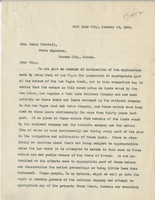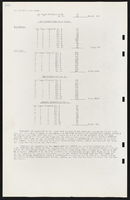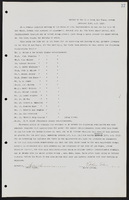Search the Special Collections and Archives Portal
Search Results

José Armando Elique interview, January 14, 2019: transcript
Date
Archival Collection
Description
José Armando Elique was born on February 14, 1944 in New York City. Born to Puerto Rican parents that immigrated to the United States in the 20s, Elique spent his childhood in both New York and Puerto Rico. Raised in the South Bronx, Elique’s family were part of the first pioneros from Puerto Ricans to settle in New York City in the twentieth century. Elique served as a radar man in the United States Navy during the Vietnam War on the USS Purdey. After his service, Elique applied to the Port Authority Police Department where his first big assignment included going undercover and investigating gang activity. Over the course of the next 22 years, he rose through the rankings becoming the assistant chief in charge of overseeing six facilities in the region. Elique is the first and only Latino to reach such rank with the Port Authority. Elique moved to Nevada in 2000 and became the chief of UNLV Police Services. Prior to coming to UNLV, he served as the University Director of Public Safety for the City University of New York (CUNY). Elique is also a member of the National Latino Police Officers Association, an organization that helps train Latino officers on contemporary issues and promote the advancement of Latinos in the police force. As police chief, Elique has fought for the hiring of new police officers to better serve UNLV’s campus and student body. As Chief of Police, Elique oversaw the response of his team to secure the campus and to provide for the needs of those seeking refuge at Thomas and Mack Center on the night of October 1, 2017. Chief Elique is also part of the Remembering 1 October oral history project where he reflected on that night, the role of campus police, coordination with Metro Police, purpose of the Fusion Center, command post, Emergency Operation Center for business continuity, and preparedness of urgent situation and active shooters. He is a graduate of Adelphi University and of Northwestern University’s Traffic Institute of Police Administration and the Police Executive Research Forum’s Senior Management Institute for Police.
Text

Letter from C. O. Whittemore (Salt Lake City) to Henry Thurtell (Carson City), October 13, 1906
Date
Archival Collection
Description
Letter to the Nevada State Engineer refuting Buol's application for water from the Las Vegas Creek since the Las Vegas Springs were on private property and entirely appropriated on that property.
Text
Joan Olson Griffith oral history interview
Identifier
Abstract
Oral history interview with Joan Olson Griffith conducted by Sharee Schrader on April 12, 2005 for the History of Blue Diamond Village in Nevada Oral History Project. Griffith begins by discussing why she moved to Blue Diamond, Nevada with her family due to job opportunities at the Blue Diamond Plant, where they manufactured wallboard, in 1956. She describes life in Blue Diamond and rural Nevada, the education available in the village, and Blue Diamond's proximity to Bonnie Springs Ranch and structures made for the filming of Western themed media. Griffith concludes by discussing how Blue Diamond has changed since the 1950s and being a Sunday school teacher for eighteen years.
Archival Collection
John P. Watkins oral history interview
Identifier
Abstract
Oral history interview with Dr. John P. Watkins conducted by Claytee D. White on April 29, 2009 for the Boyer Early Las Vegas Oral History Project. Dr. Watkins talks about his schooling, his medical career, and medicine and medical practitioners in Las Vegas, Nevada from the mid-1950s. He recalls how he met his wife, Frances (née) O’Rourke, and the Las Vegas places he, Frances, and their sons John and Brian lived. In particular, he describes their Desert Inn Country Club neighbors and neighborhood, where he and his family lived for fourteen years. He then discusses Las Vegas as a gateway to outdoor activities.
Archival Collection
Rodrigo Vazquez oral history interview
Identifier
Abstract
Oral history interview with Rodrigo Vazquez conducted by Nathalie Martinez and Barbara Tabach on May 24, 2021 for the Latinx Voices of Southern Nevada Oral History Project.
Rodrigo was raised in a mixed status Mexican family. He was born in Mexico and immigrated to the United States at the age of three, later becoming a citizen when he was in the 8th grade. Rodrigo is currently a graduate student worker for the Latinx Voices Oral History Project and reflects on what he has learned. He also discusses what the past year of the Coronavirus pandemic has been like for him.
Subjects discussed include: Latinx and Mexican identities, COVID-19 era, and Latinx Voices Project oral historian
Archival Collection
University of Nevada, Las Vegas Department of Theatre Records
Identifier
Abstract
The University of Nevada, Las Vegas Department of Theatre Records (approximately 1960-2017) are mainly comprised of the records of Ellis Pryce-Jones who was a faculty member in the Theatre Arts Department from 1972 to 2004 and Jerry L. Crawford who served as chair of the Theatre Department and the Dean of the College of Fine Arts. Records mainly represent shows produced by the Theatre Arts Department as well as documenting the evolution of the department over the years. The records document curricula used for courses, video recordings of the department's performances, and posters and other materials used to market shows. Additionally, there is a small portion of documentation from other theaters where staff and students performed and worked, some of which are located in Southern Nevada.
Archival Collection
John Mance oral history interview
Identifier
Abstract
Oral history interview with John Mance conducted by Claytee D. White on February 27, 1998 for the UNLV University Libraries Oral History Collection. In this interview, Mance discusses his introduction to the National Association for the Advancement of Colored People (NAACP), forming a local branch in California in 1955, and his continued involvement with the executive committee of the national organization since that date. He explains the heirarchy and make-up of the NAACP, from the national convention to the local branches and their rights and responsibilities. He continues talking about the officers, who are all volunteers, and the numbers of paid administrative staff. He explains his involvement in the various local branches and his forty-two years as a national board member.
Archival Collection



